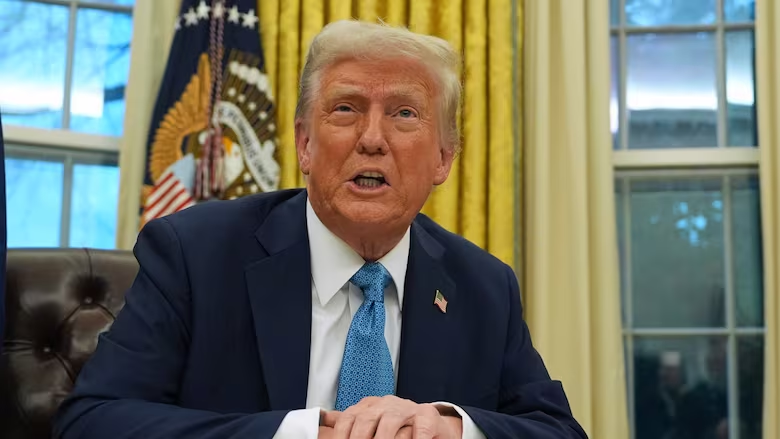Sask. farmers face uncertainty, lower prices for crops in light of 25% U.S. tariffs
U.S. President Donald Trump launched trade war Saturday with tariff on virtually all goods from Canada

The head of an organization that advocates for farmers in Saskatchewan says the province's farmers are facing uncertainty, and the likelihood they'll have to accept less money for their crops, after punishing trade tariffs launched on Saturday by U.S. President Donald Trump.
Trump launched a trade war against Canada by imposing a 25 per cent tariff on virtually all goods from this country. Canadian energy products will be subject to a 10 per cent, according to a fact sheet from the White House sent to CBC News.
These potentially devastating tariffs will take effect on Tuesday and remain in place until Trump is satisfied Canada is doing enough to stop the flow of fentanyl into the U.S., according to the fact sheet.
Bill Prybylski, president of the Agricultural Producers Association of Saskatchewan, said in order to compete with other producers on the global market in light of the tariffs, Canadian farmers may have to sell their crops for less.
That's because American buyers will be able to get the same crops from other farmers who do not have to pay the tariff, so Canadian producers will have to lower their prices to account for it.
On the other hand, capital expenditures like farming equipment, which largely come from the U.S., will become more expensive, he said.
"We're going to be getting less for our commodities and paying more for the stuff that we need," said Prybylski.
"Our hope is that as the consumers in the United States realize that their prices are going to go up because of the tariffs making things more expensive for them, that they will put pressure on their government to rescind that."
According to the government of Saskatchewan, the total value of goods and services exported by the province to the U.S. in 2023 was $26.9 billion. That accounted for 54.8 per cent of the province's total exports.
That same year, a third of Saskatchewan's foreign agricultural exports went to the U.S., worth $6.68 billion.
Jeremy Welter, a farmer in west-central Saskatchewan, said he expects the tariffs to "create a lot of economic pressure and a lot of economic pain."
"And I hate to say it, I don't think everyone's going to make it," he said.
"A 25 per cent tariff on Canada would give us worse access to the American market than 166 other countries in the World Trade Organization. We would be just above Russia and North Korea," said Welter.
"That's how Donald Trump sees Canada."
Canada's first ministers, including Saskatchewan Premier Scott Moe, were scheduled to meet at 4 p.m. ET Saturday afternoon to discuss a response to the new tariffs. Prime Minister Justin Trudeau is expected to announce a response at 6 p.m. ET.

